Colin Hanks The Great Buck Howard Interview
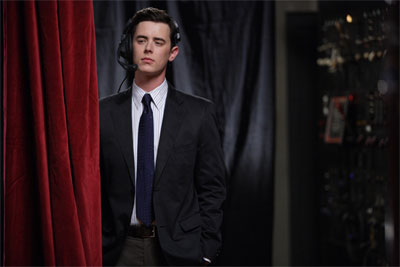
HANKS JNR A CHIP 0FF THE OLD BLOCK.
EXCLUSIVE Colin Hanks, The Great Buck Howard Interview by Paul Fischer.It was inevitable that Colin Hanks would end up in the family business nut has managed to carve out a more than respectable career without the help of father Tom. Now the two are acting together, albeit in only scenes in the Indie comedy The Great Buck Howard, produced by Tom Hanks and co-starring John Malkovitch. Colin Hanks plays Troy Gabel who is burned out by his lack of interest in law school, who seeks alternatives to the profession chosen for him by his father [Tom Hanks] and comes across an ad for a celebrity personal assistant to illusionist Buck Howard or more specifically a mentalist. His show consists of hypnotism and various guessing games always concluding with his most famous effect, a hide-and-seek amongst the audience to find the money heís being paid for the show, an effect he has never failed.
During their time on the road, a career path gone unapproved by Troy's father, Buck plans to unveil a brand new effect; one that will put him back on the relevant map once again. To help pave the way to the big moment is publicist Valerie Brennan (Emily Blunt) who is instantly insulted by Buck but takes just as quick a liking to Troy. The film explores ego, celebrity, success and failure, all of which were enticing to Hanks jnr, who spoke effusively about the film, working with Dad and his own career path, with Paul Fischer.
QUESTION: What drew you to The Great Buck Howard?
COLIN HANKS: I really liked that it was just a sweet, and very, very self-contained story, even on the page. For me, a really great indicator on if I really like something is how quickly I read it. It's, like, the most mundane and simplistic answer. But sometimes that ends up being the best answer. That, you know, if you read something, and you - time seems to fly by very quick. And before you know it, you've finished reading it. That tends to be a pretty good sign. And that's what happened when I read this. I just thought it was a great story. You know, and not necessarily - you know, just focusing on Troy, or anything like that. I thought there were some really funny, interesting characters in here that would make for a really great movie. A really enjoyable movie.
QUESTION: Did it come to you via your Dad because your father's one of the producers on this. So, did he sort of know about it, and show it to you?
COLIN HANKS: No. I read the script in 2003, and met with Sean McGinley, the writer-director and we hit it off, and so he sort of let me come on board. And then we spent quite a bit of time sort of shopping it around, trying to get financing for it, without a buck attached. We were still trying to find our buck. But we had the help of our agents, and the machinery. And someone had suggested Playtone. And obviously, you know, I was not super keen on that idea. But I said, "Well, look. I mean, I know everyone there. So why don't we send it to them, and just ask for their opinion." Essentially just, like, "Hey, what do you think about this? Any tips you might have would be greatly appreciated." And that was really how we - you know, that was really how we said it. I said, "Just take a look at it, and let me know what you think." And they ended up loving it. And so they said, "We like this so much that we want to make it, if that's okay with you." And I sort of went, "Ummmm� yeah. Okay." Because, you know, if people want to make your movie, that's - you want to work with them! So that's how that came to be. And then he sort of dropped the bomb of, "Oh, yeah. And I'm going to play your Dad for two scenes." And I just sort of went, "Okay."
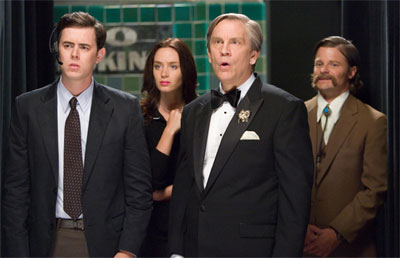 QUESTION: Is that a risky move, do you think? I mean, you've resisted working with your father. And you've really made a career for yourself without your Dad's input and help.
QUESTION: Is that a risky move, do you think? I mean, you've resisted working with your father. And you've really made a career for yourself without your Dad's input and help.COLIN HANKS: Well, I don't want to say, "Risky," but it definitely is a self-inflicting sadomasochistic type of thing. In that - you know, I've been doing this for ten years now, or roughly ten years, and have been able to make a career and have a career, and to work steadily, which I'm very grateful for. And at the same time, constantly being bombarded with the whole second generation. I mean, asking the same question in a million different ways, to the point where it's like writing in quicksand, almost. To then sort of willingly inflict that upon myself times 28, is a little weird. But at the same time, I can't really worry about anything that someone's going to say, or questions that were going to come up, or what the focus of something is going to be. The bottom line is, you know, I want to do good work. And I want to make good movies. And this is a movie that I really believed in. This was a scenario in which I knew that I was going to be in safe hands, and have a relative amount of - not control, but say in the matter. And so I figured, "Well, if this is going to happen, this might as well happen on this one." Because it's not like me and him has ever had these conversations before, like Troy and his father have had. So, you know, we're not exorcizing serious demons here.
QUESTION: In fact, this father-son relationship is obviously very different to your own father-son relationship.
COLIN HANKS: Yeah so, in that regard, it really is just make believe.
QUESTION: Was it fun working with him?
COLIN HANKS: It was fun. Yeah. You know, it's like - it's funny. Because, you know, obviously now I'm getting asked these things a lot. But people have said, "So, I heard you were nervous." And, you know, I wasn't necessarily nervous. What was nerve-wracking was the amount of people that came up to me going, "So, you're nervous? Yeah? Are you nervous? God, I'd be nervous." You know, it's that constant - the best way I can describe it is, it's like if someone says, "Hey, what's your favorite color?" And you tell `em it's green. And then they say, "Really? Really. Your favorite color is green? Why is your favorite color green?" And they ask you 18 questions about why your favorite color is green. And around question five, in the back of your mind, you start thinking, "Well, I don't know. I kind of like blue. Maybe they're right. Maybe green isn't my favorite color." You know, it's just this barrage of certain questions, on something that is not really something that you think about very much, you know? It's not - you know. Being my Dad's son is - look. I had no control over the matter.
QUESTION: Let's switch from your Dad to Malkovitch because I thought Malkovitch nailed this character.
COLIN HANKS: Well, this is the other thing that I'm really excited about the movie, is that - you know, even on the page, Buck was a very fun character. But once we got John, he just devoured it, and took it to this whole other place, and just took such ownership over it. It was really a joy to see. And now, I can't imagine anybody else playing that role.
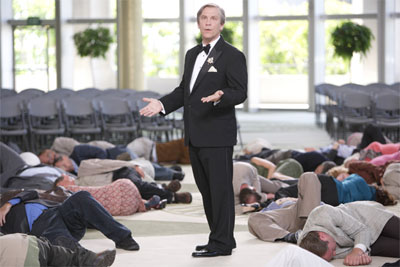 QUESTION: What do you learn as an actor, working with somebody like John Malkovitch?
QUESTION: What do you learn as an actor, working with somebody like John Malkovitch?COLIN HANKS: Well, you learn that A, you never have any idea of what a person is like until you meet him. That's for sure, because he's an absolute joy. I mean, I just loved working with him. I just - he was tremendous. And, you know, he has this - I don't know. He's just - he's one of the more fascinating people I've ever met. I've never worked with anyone who could be standing 15 feet away from camera, and then ask the cameraman, "Are we"-he wouldn't ask what lens we were on. He would say, "Are we on a 28? We're on a 28?" And then he would know exactly where frame was. Like, he just instinctively knew - he could do the geometry in his mind, that he just knew right away. So, there's little things like that. And then there's little things of just sort of like, really taking ownership of the character, and not having it be a representation of him. It's somebody else. You know? And he just would come up with all of these little things with Buck. I mean, he had the luxury of having a character where that was sort of called for. But he would come up with all of these little extra bonuses. These little sort of ad-libs, and stuff like that, that really just made Buck sort of who he is. And it was really a great joy to do that. And, the man can just talk about anything. Which is always a pleasure, when you can always find something to talk about with somebody, even if it's the most ridiculous thing ever. I mean, he would talk about why he prefers In 'n Out to White Castle sliders.
QUESTION: Tell me about the nature of your character, and whether or not you have an affinity with this guy's sense of maybe restlessness in his life, and the way he takes this job as a way of avoiding a degree of responsibility.
COLIN HANKS: Well, when you dig deep on it, that's the kind of interesting thing there. Is that in some ways, he is kind of avoiding responsibility. He's dropping out of school, he's not telling anybody. He's moving to LA because he's got this harebrained scheme of being a writer, even though he's never really written anything before. So in one way, he is sort of running away from responsibility. Yet in another way, he's totally taking - he is taking responsibility for his own life. And he's making his own decision, and he's doing it on his own, with no help from anybody else. And he just has to do it. He feels like if he doesn't do it, he's just not going to be able to wake up every day doing the other stuff. That element of someone really taking charge of their own life, is something that is, I think, a universal theme that everyone can sort of relate to. But also, I liked the idea of him wanting to have some sort of genuine experience that is new, and that is exciting. And it may not be pretty, it may not be fun, but at least it's an experience, for better or for worse. And when Troy and Buck have that scene after that first run in Bakersfield, and - you know, I mean, Buck sort of calls him out on it. He says, you know - "The one thing I can't offer you is experience." And that is, I think, the only thing that Troy really wants. He wants a genuine experience. It doesn't matter if it's great, or if it's sometimes the most unpleasant experience there is. But it is a genuine experience, much like Buck is sort of the genuine article, in however - whatever kind of article Buck is, at the end of the day.
QUESTION: You've managed to play a variety of really interesting young characters in this decade, or career of yours. How challenging is it for you to continue to challenge yourself? And how competitive are you in getting the roles that you want?
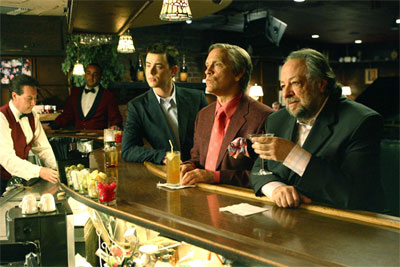 COLIN HANKS: It's hard. It's very hard, you know? I don't know - you know, sometimes I sort of feel like it's - in one way, it's almost refreshing to hear you ask that. Because sometimes I feel like I'm the only one that noticed, that seems to care. [LAUGHTER] But - you know, I mean, it's hard. I'm always wanting to try and do things that are interesting to me, and work with interesting people. And you're lucky if you can get that. That doesn't always happen all the time. And I'd been fortunate, in that every couple of years or so, I've been able to sort of find myself in a position where I am working with those kinds of people, and I am - I do have a role that's kind of interesting. For me - look. I understand how the business works. And I'm in a little bit of a gray area. I'm kind of like - and this is going to be - maybe I shouldn't even say it. But, in a strange way, it's kind of like that horrible Britney Spears song, you know? I'm not a boy, but I'm not quite a man yet. I'm paraphrasing the lyrics, because I don't want to pretend like I actually know the lyrics to that song. But, you know. In terms of casting, in terms of roles, that's a hard - there's not a lot there. It's very specific, you know? Once you get into the big movie casting realm, there are very specific things to find, and there are very specific people for specific roles. And even just trying to break out of those molds can be kind of difficult.
COLIN HANKS: It's hard. It's very hard, you know? I don't know - you know, sometimes I sort of feel like it's - in one way, it's almost refreshing to hear you ask that. Because sometimes I feel like I'm the only one that noticed, that seems to care. [LAUGHTER] But - you know, I mean, it's hard. I'm always wanting to try and do things that are interesting to me, and work with interesting people. And you're lucky if you can get that. That doesn't always happen all the time. And I'd been fortunate, in that every couple of years or so, I've been able to sort of find myself in a position where I am working with those kinds of people, and I am - I do have a role that's kind of interesting. For me - look. I understand how the business works. And I'm in a little bit of a gray area. I'm kind of like - and this is going to be - maybe I shouldn't even say it. But, in a strange way, it's kind of like that horrible Britney Spears song, you know? I'm not a boy, but I'm not quite a man yet. I'm paraphrasing the lyrics, because I don't want to pretend like I actually know the lyrics to that song. But, you know. In terms of casting, in terms of roles, that's a hard - there's not a lot there. It's very specific, you know? Once you get into the big movie casting realm, there are very specific things to find, and there are very specific people for specific roles. And even just trying to break out of those molds can be kind of difficult.QUESTION: Are you still doing any more Mad Men? Or are you done with that?
COLIN HANKS: Well, I would love to. If the opportunity comes up, I would absolutely love to. I don't know. But obviously that - Mad Men, for me, was a real watermark for me. I was really able to start a new chapter with that, because - and I was talking about this with Matt Weiner. He said, "This is your first real adult role here."And he was right. I was extremely fortunate enough to be able to do that, and to work with such talented people. I mean, I had such great respect for everyone that works on that show, because it's back-breaking. I mean, it's a back-breaking schedule and you think it's all peaches and cream, and easy, because everybody looks so fabulous on the show, and everyone's so good. But you've got to want it and they all want it which is really great, and that's really exciting. Youu know, look. I got sick of doing scenes next to lockers a long time ago. And for me, I got really sick of doing those movies about - you know, really wanting to get invited to the party, or really wanting to get the girl, or really wanting to do any of those things. Those movies are fine. It's just not necessarily for me, so I'm constantly trying to find new stuff that interests me, not stuff that's shocking.
QUESTION: Well, what is next, for you?
COLIN HANKS: Well, right now, to be honest, I'm so immersed in this play that I'm doing on Broadway, that I don't quite know.
QUESTION: What are you doing?
COLIN HANKS: I'm doing the new Moises Kaufman play called 33 Variations, with Jane Fonda and Samantha Mathis, which has been amazing and exhilarating, and quite a lot of fun. And even though I could barely finish the script when I read it, it was - and I'm not afraid to admit I felt very stupid after reading the script. I wasn't sure if I understood it, because it was such a detailed, beautiful piece of work. But I've been busy with that. I mean, we've been in rehearsals-- we've been in previews for about 3 � weeks, and were in rehearsals for four weeks prior to that, and we open on Monday. So, it's all very chaotic, and very strange right now.
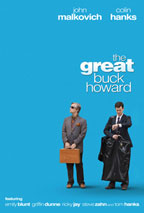
The Great Buck Howard
MORE
- Viggo Mortensen The Road
- 24 Cast Reunion
- Aaron Eckhardt No Reservations
- Aaron Eckhart The Dark Knight
- Adam McKay Step Brothers Interview
- Alan Alda Diminished Capacity Interview
- Alan Alda Diminished Capacity Interview
- Alex Dimitriades
- Al Pacino Oceans 13
- Alan Rickman Snow Cake
- Alan Rickman Sweeney Todd



